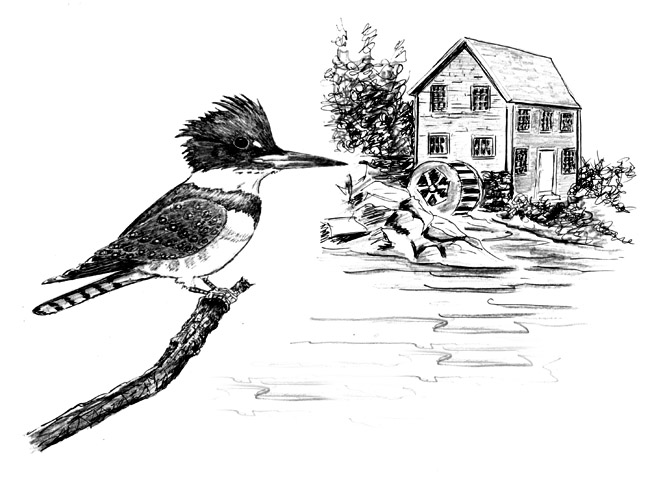
Dear Bird Folks,
The other day I saw a kingfisher near Great Pond, in Eastham. (Actually, I heard it long before I saw it.) Do kingfishers stay here all winter?
– Beth, Eastham, MA
I believe you, Beth,
I totally believe that you “heard” the kingfisher before you saw it. Kingfishers are very vocal. But unlike songbirds, which often sing delightful melodies, kingfishers are cantankerous, foulmouthed, paranoid birds (or at least that’s my take on them). I don’t care what you look like or how far away you are, if a kingfisher sees you, it will immediately take flight. But it won’t be a normal, leisurely flight. It will be a panicked flight, as if it had just seen Satan. Plus the entire time it’s flying, it will be spewing a harsh rattle of bird profanities – sounding like a combination of a rock tumbler, Charlie Sheen and me, when I get up in the middle of the night and stumble into the furniture my wife has rearranged…yet again.
You should not be offended if a Belted Kingfisher unleashes its string of rattling curses your way. We all get the same treatment. Kingfishers hate everyone and everything, including each other. With the exception of the mandatory breeding season, kingfishers are true loners and aggressively defend their feeding areas from all comers. If another kingfisher is silly enough to get too close to a guarded fishing hole, the current occupant will not only unleash the aforementioned verbal tirade, it will also physically attack the interloper. Don’t mess with this king.
Belted Kingfishers aren’t just bluffing either. They are remarkably tough birds. Weighing a mere five ounces, kingfishers are able to breed throughout the continent. They are found in habitats that range from the sweltering landscape of Florida to the frigid conditions at the Arctic Circle. Kingfishers only have one major requirement: they need clean water and fish. (Actually, that’s two requirements, but I’m having trouble with my backspace key, so just pretend I wrote “two requirements” the first time.) Kingfishers typically hunt by sitting patiently above the water’s edge and watch for any small fish that happen to venture too close to the surface. Once prey is spotted, the bird will dive in headfirst, pluck the fish out of the water and carry it back to its perch. The take-no-prisoners bird will then proceed to beat the fish senseless, before swallowing it whole. The fleshy parts of the fish are digested, but not the bones and scales. The undigested parts will be spit out with a menacing sneer. (In reality, there is no sneer. Some of these dark descriptions are only for dramatic effect…but not all of them.)
Another necessity for kingfishers is riverbanks. (I know I said the birds only had one requirement and now I’m up to three, but there is nothing I can do about it. Stupid backspace key.) Kingfishers build their nests at the end of long tunnels, which are dug into the sides of riverbanks. The birds excavate the tunnels with their sturdy beaks and then, like a dog digging up a bone, will kick the dirt out with their feet. If they can’t find a riverbank, kingfishers will also use gravel pits, construction sites and sandbanks. But they never go near the bank I use; my bank has too many hidden fees.
Newly-hatched kingfishers are also fed a diet of fish, but they don’t spit out the bones (with or without a sneer). It seems the baby birds produce excess stomach acid that helps to dissolve the bones. That lack of bone-spitting keeps the nest chamber clean. But what about the poop? Doesn’t that foul up the nest? How do birds deal with that? Check this out.
Unlike songbird poop, which is often excreted in tiny gelatinous packets that the parents must carry away, baby kingfishers don’t poop out packets of anything (much to their parent’s relief). When little kingfishers have to poop, they turn their backs towards the side of their burrow and let it rip against the wall. Then, in an impressive feat of sanitary engineering, the little birds take their little beaks, dig into the ceiling and cover up the splattered area with fresh dirt. How about that? Baby kingfishers keep their own nests tidy, while my kids still can’t figure out the clothes hamper technology.
Once the babies fledge, the parents will continue to care for them, but not for long. There is only so much social interaction kingfishers can stand. After only a few weeks the adults have had enough and leave the area to resume their lives as crusty old loners. Eventually, the young birds will also fly off to find their own fishing areas. But unless the kids want to hear a lot of cursing, they won’t go anywhere near either of their parents. Having an extended Norman Rockwellish family isn’t in the kingfisher’s DNA.
So, there you have it, Beth. Despite a few personality disorders, kingfishers are pretty cool birds. Wait! I never actually answered your question. (I forget to do that sometimes.) Yes, kingfishers can be found on Cape Cod year-round. As I mentioned early, kingfishers are tough birds and a little cold doesn’t bother them. As long as they can find open water and a few fish, they’re happy (well, happy by kingfisher standards.) Oh, there a fourth thing kingfishers need and definitely should have, and that’s a swear jar. However, it would have to be an extra large jar, as they’d fill a small one in about four minutes.